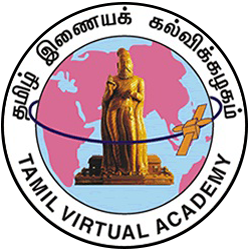Primary tabs
-
PLAN OF THE TAMIL LEXICON
All words, derivatives and compounds as well as parent-words, are arranged in a strictly alphabetical order,viz.,(1) vowels, (2) the aspirate aytam, (3) mute consonants, each with its syllabic series, and lastly the Grantha letters adopted (vide the Transliteration Table).
The general order in the arrangement of an article is as follows:-
(1) The word, (2) the transliteration, (3) the part of speech, (4) the origin and derivation,(5) the cognates, (6) the meaning (a) in English and (b) in Tamil and (7) quotations under each meaning, with chapter and other details of the authorities cited, as also illustrative expressions. All these seven features are not, of necessity, present in all or even in the majority of words; (4), (5)and (7)may be absent under many words for obvious reasons.
To take up each of these in order:
I. The Word.
1.Compound words as well as uncompounded individual words are given in the Lexicon.
The compound words admitted are either
(a)
those that have contracted forms owing to the omission of case-endings, particles, etc.,e.g., கைகொட்டு- தல்
(b)
those fused into a new unit as it were, e.g., கற்ளச்சன் or
(c)
those that have acquired new or specialized meanings, e.g., நீட்டு - மல்,
Such compound words are usually given in their most common spelling or combination.
Derivative words, such as verbal nouns, are given only when they have acquired new or specialized meanings, e.g.,நடக்கை
2. Words of all parts of speech, words in ordinary use in Tamil, either of native origin or derived from Sanskrit or other languages, words incorrupt forms that usage has sanctioned, words with veiled, euphemistic or ironic meanings, the argot or canto special classes, technical words of the arts and sciences, local words and expressions, literary words and phrases, technical terms of Tamil Grammar, Prosody and Rhetoric, the special vocabulary of the nursery, the dialectal speech of the vulgar and of special communities-all these find their appropriate places in the Lexicon.
3. Up to the end of page 506(i.e.,to the end of the second part of Volume I), words of non-Tamil origin, used either singly or in combination with other words, are indicated by asterisks preceding them. As the origins
Page

HOME

